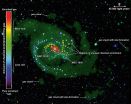(Press-News.org) (PARIS, FRANCE) - New data released today at EuroPCR 2015 suggest that thickening of the valve leaflets following implantation of a transcatheter or surgical aortic valve bioprosthesis is relatively rare, not linked to short-term clinical events, and not unique to any one type of valve. Longer-term follow-up and larger studies looking specifically at this issue are warranted, experts said here at a special session devoted to the emerging understanding of the phenomenon.
"At the present time, there is no evidence to support a change in patient selection, procedural aspects, or post-procedural management for transcatheter aortic valve implantation (TAVI) or surgical aortic valve replacement (SAVR)," said Dr. Lars Søndergaard of Rigshospitalet, Denmark, who led one of the leaflet studies. "But the findings call for further studies."
Well over 100,000 transcatheter aortic valve implantation procedures have been performed worldwide, making the minimally invasive procedure a standard therapy for patients with inoperable severe aortic stenosis, as well as for high-risk patients who are eligible for conventional surgery. In September 2014, imaging studies used in a US-based trial of a TAVI device identified thickening and reduced mobility of the device leaflet following implantation, prompting concerns that this phenomenon could have adverse clinical effects for the valve recipients. As a precaution, the trial was paused.
"In the short term we have not seen clinical consequences such as strokes, but larger and longer term studies are needed," said Dr. Raj Makkar, associate director at Cedars Sinai Heart Institute, and author of another featured study. "These imaging findings should be looked at in the context of robust clinical trial data that is available on the efficacy of TAVI and SAVR."
During today's session, researchers presented results from three separate, single-centre studies providing insights from a total of 345 patients treated with a range of transcatheter or surgical valves. Among the insights:
CT and echocardiographic imaging at 5 days, 30 days, or at later time points, depending on the study, found a spectrum of abnormalities including hypo-attenuated leaflet thickening, impaired leaflet motion, and thin films or small aggregations believed to be thrombus, in 7-15% of patients.
Abnormalities detected on imaging were not unique to a particular surgical or transcatheter valve.
Leaflet abnormalities were not associated with clinical events (stroke, systemic embolism, or valve failure), although follow-up, so far, has been short.
Most advanced abnormalities resolved with the use of oral anticoagulants, although patient selection, anticoagulant type, and anticoagulant dose have not been established.
"The findings remind us that evidence is lacking for the current focus on antiplatelet therapy for newly implanted aortic bioprotheses," said Dr. Franz-Josef Neumann, medical director for the Department of Cardiology and Angiology II, University Heart Center Freiburg, Bad Krozingen, and lead author on the third study. "Nevertheless, it may be difficult to make advances, given the low level of risk that we have achieved already."
Dr. Bernard Prendergast, session co-chair and co-director of PCR London Valves as well as director of the Cardiac Structural Intervention Programme at Guys and St Thomas' Trust in London, UK, commented "TAVI is an established life saving procedure with a wealth of high quality clinical evidence demonstrating its safety, durability and effectiveness. The reassuring data presented today indicate that there is no need for clinicians to adjust their practice in relation to patient selection, performance of the TAVI procedure, or follow up protocols, including post-procedural imaging and anti-thrombotic therapy."
INFORMATION:
CONTACT: Dr Bernard Prendergast, bernard.prendergast@gstt.nhs.uk
Associated EuroPCR 2015 Session: Breaking news: leaflet thickening and reduced motion of biosprosthetic aortic valves, 8:15-9:50 CEST, Thursday May 21, Main Arena
Notes to Editors
For more information on the abstracts featured in this press release, please contact Isabelle Uzielli, email: iuzielli@europcr.com
Further information on press registration may be found at http://www.europcr.com/page/press/619-press.html
What is EuroPCR?
EuroPCR, the official annual meeting of the European Association for Percutaneous Cardiovascular Interventions (EAPCI), a registered branch of the European Society of Cardiology, is the world-leading course in interventional medicine. PCR has established a distinctive format for educational activities in the field of cardiovascular interventions. Beyond its flagship course in Paris that gathers more than 12,000 participants every year, PCR organises annual courses in Singapore; London, UK; Dubai, EAU; Johannesburg, RSA; Istanbul, Turkey; Chengdu, China; and Tokyo, Japan.
For further information on EuroPCR, AsiaPCR/SingLIVE, PCR London Valves, GulfPCR-GIM, AfricaPCR, PCR Istanbul Peripheral, PCR-CIT China Chengdu Valves, PCR Tokyo Valves & PCR, please contact: Anne-Sophie Lartigau at aslartigau@europa-organisation.com.
For more information, please visit http://www.europcr.com
In January 2015 a report published as a research letter to the New England Journal of Medicine (NEJM) (1) found that a 3rd generation e-cigarette (an e-cigarette with variable power settings) set to the maximum power and long puff duration generated levels of formaldehyde that, if inhaled in this way throughout the day, would several times exceed formaldehyde levels that smokers get from cigarettes. Media worldwide accordingly reported this new health hazard of e-cigarettes.
A new study published online today in the scientific journal Addiction took a closer look at ...
A team of Australian and Spanish astronomers have caught a greedy galaxy gobbling on its neighbours and leaving crumbs of evidence about its dietary past.
Galaxies grow by churning loose gas from their surroundings into new stars, or by swallowing neighbouring galaxies whole. However, they normally leave very few traces of their cannibalistic habits.
A study published today in Monthly Notices of the Royal Astronomical Society (MNRAS) not only reveals a spiral galaxy devouring a nearby compact dwarf galaxy, but shows evidence of its past galactic snacks in unprecedented ...
The success of corals that adapt to survive in the world's hottest sea could contribute to their demise through global warming, according to new research.
Researchers from the University of Southampton and the New York University Abu Dhabi found that local adaptation to high salinity levels in the southern Persian/Arabian Gulf (PAG) may prevent coral escaping their fate, as they lose their superior heat tolerance in waters with normal salinity levels.
The research is published this week in The ISME Journal, a world leading publication platform for ecological research, ...
Malaria is a cruel and disabling disease that targets victims of all ages. Even now, it is estimated to kill one child every minute. Recent progress in halting the spread of the disease has hinged on the use of insecticide-treated bed nets and spraying programmes that target the insect that spreads the disease, the African malaria mosquito (Anopheles gambiae). However, the insects are fighting back, developing resistance to insecticides such as pyrethroid that control their numbers, forcing Brian Foy and Jacob Meyers from Colorado State University to think of alternative ...
Report shows 38 MPs have accepted over £60,000 of industry hospitality since 2010
More than half of these MPs are from constituencies where the number of smoking related deaths exceeds the national average
20 of the 38 MPs who accepted hospitality voted against plain packaging
An investigation by The BMJ today asks to what extent is the tobacco industry able to reach out and influence parliamentarians?
It shows that since 2010, 38 MPs -- 29 Conservatives, eight Labour, and one independent -- have accepted over £60,000 worth of tobacco industry hospitality, ...
Cold weather kills 20 times as many people as hot weather, according to an international study analysing over 74 million deaths in 384 locations across 13 countries [1]. The findings, published in The Lancet, also reveal that deaths due to moderately hot or cold weather substantially exceed those resulting from extreme heat waves or cold spells.
"It's often assumed that extreme weather causes the majority of deaths, with most previous research focusing on the effects of extreme heat waves," says lead author Dr Antonio Gasparrini from the London School of Hygiene & Tropical ...
ATS 2015, DENVER -- Chronic obstructive pulmonary disease, or COPD, is associated with increased risk of dying from a cardiovascular disease such as heart failure or a heart attack, as well as diseases not associated with the heart. However, COPD is not by itself associated with increased likelihood of having a stroke or a systemic embolism, according to a new research study.
Researchers from Duke University and the Mayo Clinic reached this conclusion after analyzing data from a large randomized trial of patients with atrial fibrillation, a condition that produces ...
MINNEAPOLIS - People with depression may be more likely to develop Parkinson's disease, according to a large study published in the May 20, 2015, online issue of Neurology®, the medical journal of the American Academy of Neurology.
"We saw this link between depression and Parkinson's disease during over a timespan of more than two decades, so depression may be a very early symptom of Parkinson's disease or a risk factor for the disease," said study author Peter Nordström, PhD, at Umeå University in Umeå, Sweden.
The researchers also examined siblings, ...
DALLAS, May 20, 2015 -- Group behavioral therapy that encouraged walking at home significantly improved and prevented mobility loss among patients with clogged arteries in the legs, according to research in the Journal of the American Heart Association.
Known as peripheral artery disease (PAD), clogged arteries in the legs can cause pain and fatigue while walking. Maintaining mobility is integral to preserving functional independence, social interactions and daily activities.
Although studies have shown that supervised exercise on a treadmill improves walking endurance ...
DALLAS, May 20, 2015 -- Large waistline, cholesterol disorders and other metabolic abnormalities may increase the risk of cardiovascular disease more among black women than among white women, according to new research in Journal of the American Heart Association.
Previous studies have focused primarily on white participants and found that obesity without a clustering of at least three metabolic disorders (metabolic syndrome) was not associated with increased cardiovascular disease risk. The metabolic abnormalities included in the definition of the metabolic syndrome are ...

